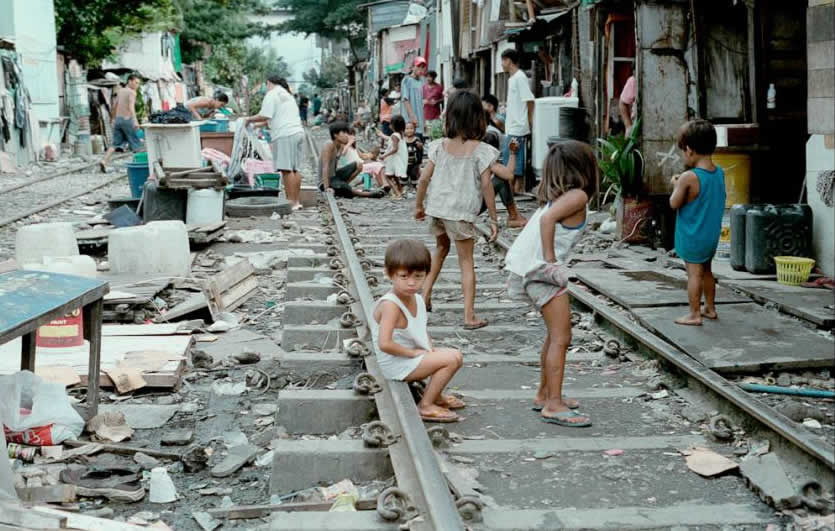|

Living and playing along the rails. Children like these are the preferred demographic for recruitment by criminal syndicates. Jay Directo/AFP/Getty Images

he Philippine
House of Representatives appears to have “railroaded” the controversial House
Bill (HB) 8858 lowering the age children can be held criminally liable under
Philippine law to 12 years of age. In an article in Rappler, Mara Cepeda writes
that the “House of Representatives approved on 2nd reading the bill that would lower
the minimum age of criminal responsibility from the current 15 years old.”
It is important to point out that HB 8858 initially sought to lower the age in
question to 9 years! Luckily, before the bill’s second and final vote,
legislators brought it up to 12 years of age. Cepeda writes that that move
“aligns the House version of the bill with the two being deliberated in the
Senate.” And to make this atrocious new law more palatable to the public,
“lawmakers also agreed to change the phrase “criminal responsibility” to “social
responsibility.”
But no matter how Filipino lawmakers try to “spin” it, the law they just passed,
with barely 2 days of plenary deliberation, speaks volumes about what they—and
by extension—the rest of us have become.
The law was meant to fix a law enforcement problem whereby criminal syndicates
would use underage youths to carryout their criminal activities. When caught,
these young criminals could not be prosecuted, and so the government now wants
to correct this problem by bringing down the age at which these juveniles can be
charged.
An article by Jodee A. Agoncillo, reporting for The Philippine Daily Inquirer
noted that the Philippine Pediatric Society Inc. (PPS), and “Filipino child
experts from Child Protection Unit, Philippine Society for Developmental and
Behavioral Pediatrics and Philippine Society of Adolescent Medicine upheld the
‘scientific and medical’ basis for maintaining” the present age-limit of 15.
Agoncillo noted that the above groups were not consulted and points out that the
“PPS and the others said the government should instead fully implement the
current juvenile justice law.”
At its core, this though-out law that was pushed through congress has
significant flaws. For starters, the law says that minors can be held criminally
liable if they “acted with discernment.” What exactly does that mean? If a child
is forced by his or her criminal-syndicate-handler to commit a crime, does that
constitute discernment?
Another provision "imposes mandatory counseling or intervention for the parents
of children who committed serious crimes. Failure of the parents to undergo
counseling or intervention shall be ground for imprisonment." While this
provision might appear laudable at first glance, it displays the utterly naivete
of the congressmen who wrote it. These kids come from indigent and even
none-existent families. For the most part, there is no mother and father who can
talk things over with the child over the dinner table. Most likely, home is a
cardboard box under a bridge, or by the banks of a river or floodway. Parents,
if they exist for these children have their hands full just staying alive and
putting food in their mouths, they will simply be unable to provide the guidance
the law requires. So, do they now also end up in jail because of that?
Also, the congressmen who wrote this law appear oblivious to the fact that many
impoverished parents may not have the necessary parenting skills, many are
addicted to drugs or alcohol, and many others may resort to physical abuse in
dealing with their children.
What this law does is throw back to the victim and his or her family, the
responsibility that should belong to the state. This law is completely
wrong-headed and will do nothing but make matters worse.
The deck is truly stacked against poor young kids in the Philippines. Because of
their economic circumstance, they are targeted by criminal elements at an age
when they do not have the wherewithal to resist or say “no.” Then, when they are
eventually apprehended by law enforcement, they are treated as adults and sent
to jail. This is not how a responsible country takes care of the most vulnerable
in its society.
The kind of law Congress should have passed
First, instead of bringing down the age when children can be held criminally
liable, Congress should have actually raised it up to the age of 18 like they
have in most civilized countries around the world.
Secondly, criminal syndicates or individuals that use children for crime should
be the ones targeted, not the children. They should automatically get
significantly longer jail sentences. This should dissuade them and others from
employing children to commit crime.
Lastly, the state cannot expect poor and indigent parents to have the skills and
resources to reform or “straighten out” their children. The state must take on
this responsibility by making indigent children who are apprehended for crimes,
wards of the state. These children should be taken off the streets and sent to
properly managed places that can give them the training, education, and
continuing support to help them grow up to become productive members of society.
Published 1/24/2019
|